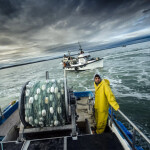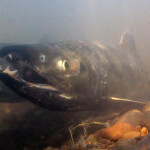An effort to expand the annual quota of elvers – also known as “glass eels” – in Maine by 20 percent failed on Wednesday, 8 August, after the Atlantic States Marine Fisheries Commission rejected the proposal.
Maine’s lucrative elver harvest, which surpassed USD 21 million (EUR 18 million), ran from 22 March to 7 June. The season kicked off with record high prices as catches of japonica eels – the variety caught in Japan – faltered. The compete ban of the export of European eels also resulted in higher demand for Maine’s elvers.
Elver fishermen in Maine are allowed to harvest 9,688 pounds of elvers a year, but sought to increase the harvest to 11,749 pounds.
While the increase to the overall quota was voted down, 13-5, a quota of 200 pounds was secured for a Thomaston eel farmer to build a new aquaculture center. Known as "American Unagi," the facility is planning to build an aquaculture center to raise the elvers to adulthood for sale.
The fishery, once a niche, now represents a larger landing-by-ex-vessel value than scallops and is nearly as lucrative as softshell clams. As the price for the small baby eels has been regularly reaching around USD 2,500 (EUR 2,152) per pound, the incentive for individuals to poach them has increased.
That was made obvious when the season was closed early after the Maine Department of Marine Resources discovered that illegal sales were occurring.
“An investigation by the Maine Marine Patrol revealed that some Maine elver dealers were paying a cash amount that was substantially less than the per pound price for elvers that were harvested and accounted for through the state’s swipe card system,” stated the DMR in a release on 24 May, two weeks before the scheduled date of closure.
The early closure was due to the unknown impact the poaching had on the fishery. Determining what kind of impact fishing for elvers is having on the population is difficult, according to officials. Stock assessment scientists said the fishery is still “depleted,” and that determining the impact of fishing will take time as the American eel doesn’t reproduce until they are 30 years old.
According to Patrick Keliher, the commissioner of the Maine DMR, the state plans to increase penalties for anyone caught poaching, including a "one-strike" bill allowing the agency to permanently revoke and elver fisherman's license for even one violation of the laws.
“I’m impressed with the efforts that Maine has gone through to strengthen the reporting and monitoring of the fishery,” said Roy Miller, a Delaware commissioner. “Nonetheless, our only advice from the stock assessment scientists was that this stock remains depleted, and that we don’t know what the effect of harvest of Maine glass eels will have on the rest.”






